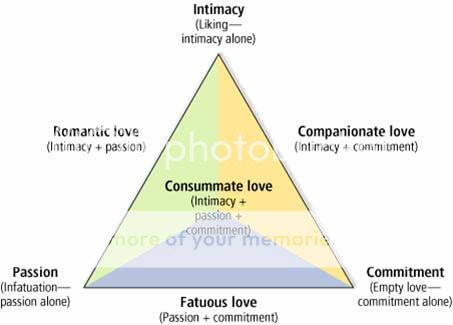One of the most comprehensive theories about the types of love. Thoughts?
http://www.squidoo.com/triangular-love-theory

http://www.squidoo.com/triangular-love-theory
The triangular love theory is based on the three components of love: intimacy, passion, and commitment. Having an understanding of triangular theory of love can help shed light on your current relationship or marriage.
The Three Components of Love [h=3]According to the triangular theory of love[/h]
Sternberg defines the three components of love as intimacy, passion, and commitment. With different combinations of these elements, there are varied types of love.
Intimacy
Intimacy is feelings of bonding, closeness, support, openness, and connectedness in a relationship.
Passion
Passion is the drives that contribute to physical attraction, sexual desire, lust, euphoria, and romance.
Commitment
Commitment is the decision to love someone and remain loyal, in order to maintain the relationship.

- Liking - The first type of love, according to triangular love theory, is liking. Liking consists of only intimacy. This type of love typically applies to friends, but that does not necessarily mean that a romantic relationship cannot bloom. Some people are actually friends with someone for a while before they begin to have romantic feelings for that person.
- Infatuated Love - The second type of love is referred to as infatuated love, which consists of the passion component. An example of infatuated love is when you experience love at first sight. You are physically attracted to the person and may feel sexual urges, but there is no intimacy or commitment. Infatuated love can evolve into a "higher level" of love later on. However, many cases of infatuated love appear and vanish relatively swiftly.
- Empty Love - You don't even need knowledge of triangular love theory to know what empty love is. Empty love consists of only commitment. There is neither passion nor intimacy in empty love. Most people tend to think of a once thriving, passionate relationship that slowly morphed into an empty love many years later. While some marriages do turn into empty love, that is not the only example.
- Romantic Love - According to Sternberg's triangular theory of love, romantic love is the combination of passion and intimacy. This means that you like and desire someone, but are not willing to commit. A relationship that begins with romantic love can turn into empty love once the passion dies. In the event that intimacy is developed, the relationship does not turn into empty love.
- Companionate Love - The fifth type of love, in accordance with the triangular love theory, is companionate love. This type of love consists of intimacy and commitment. Companionate love is common in long term relationships, in which the initial passion and excitement wear off. However, companionate love can also refer to family relationships, friendships, and non-sexual relationships. Contrary to popular belief, some people still do wait until marriage to have sex. A companionate love can also form in a long term relationship, in which the passion dies off.
- Fatuous Love - Fatuous love contains passion and commitment. You are committed to and feel lust for your partner. You do not have a special bond with each other and do not share your thoughts and feelings often. Fatuous love is more common when passion is the reason two lovers marry.
- Consummate Love - Last, but certainly not least, is consummate love. Consummate love consists of intimacy, passion, and commitment. Of course, this is viewed as the ideal type of love or the highest level of love, because it has it all. In my opinion, consummate love is what many people mean when they refer to "true love." Unsurprisingly, consummate love is rare. In fact, Robert Sternberg says that consummate love is easier to achieve than to maintain. Maintaining consummate love is very challenging. Sternberg also cautions that:
Without expression even the greatest of loves can die. -- Sternberg
Last, but certainly not least, is consummate love. Consummate love consists of intimacy, passion, and commitment. Of course, this is viewed as the ideal type of love or the highest level of love, because it has it all. In my opinion, consummate love is what many people mean when they refer to "true love."

